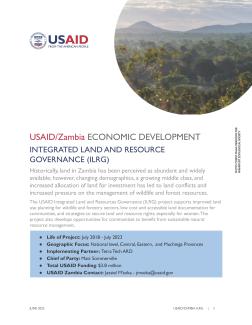Historically, land in Zambia has been perceived as abundant and widely available; however, changing demographics, a growing middle class, and increased allocation of land for investment has led to land conflicts and increased pressure on the management of wildlife and forest resources.
The USAID Integrated Land and Resources Governance (ILRG) project supports improved land use planning for wildlife and forestry sectors, low cost and accessible land documentation for communities, and strategies to secure land and resource rights, especially for women. The project also develops opportunities for communities to benefit from sustainable natural resource management.
|
The ILRG project builds the capacity of local organizations, district and national government, traditional leaders, and communities to document land and resource rights and to use this data to better inform land use planning and development decisions.
The project supports a decentralized natural resources management model and encourages active engagement between government authorities and customary leaders on wildlife, forestry, and land. ILRG integrates best practices into land and natural resource policy and legislation through consultative processes. ILRG also works with local partners to pilot implementation of progressive legislation and regulations that promote community-based management of natural resources.
ILRG supports the integration of wildlife and forestry into the integrated development planning process. The project also pilots sustainable, community-based natural resource management approaches that reduce conflict, conserve biodiversity, increase carbon sequestration, and generate income for rural communities.
In all its interventions, the ILRG program integrates gender equality and women’s economic empowerment. Strengthening land and resource rights for women is a powerful avenue for change and is directly linked to gains in women’s equality and empowerment. Increasing women’s rights to land and resources also enhances gains towards other development goals by fostering increased income generation, farm productivity, food security, improved nutrition, and education for children.
In rural communities, the sustainability of interventions will rely on community engagement in administering and documenting rights to land and natural resources, and encouraging community ownership of their development agenda.
Results
The work of ILRG activities are expected to lead to improved management of 1.5 million hectares of biologically significant areas in the Luangwa and Kafue landscapes.
Achievement Highlights to date:
- Supported improved management of over 783,000 hectares of biologically significant land.
- Supported the House of Chiefs to improve customary governance through a diploma course in Traditional Leadership with Chalimbana University and to launch Gender Guidelines for Traditional Leaders in the Management of Natural Resources.
- Increased women’s participation in resource governance committees at multiple levels and provided tools and training for women’s empowerment across the wildlife sector.
- Supported the Department of National Parks to review the training curriculum for Wildlife police officers and community scouts.
- Supported the government to adopt and launch the National Lands Policy.
- Supported documentation of land rights for more than 30,000 parcels of land, including 155,000 rights holders, of which 50 percent are women.

